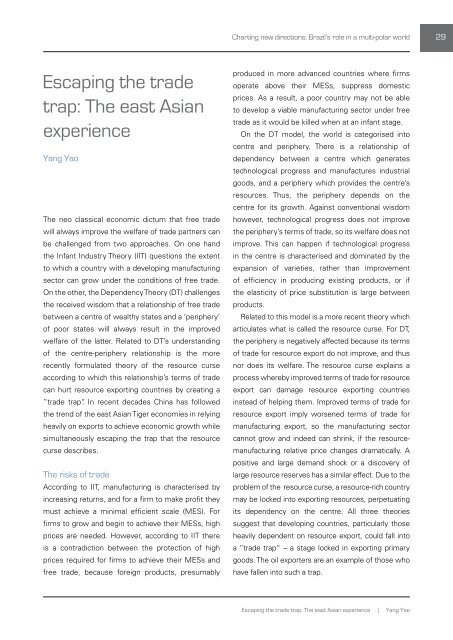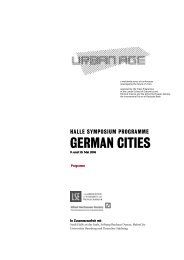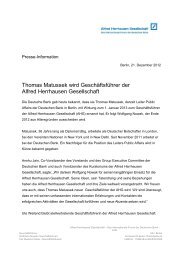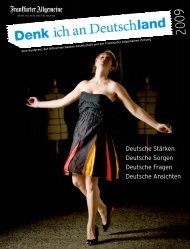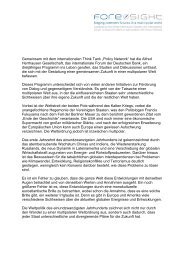Charting new directions: - Alfred Herrhausen Gesellschaft
Charting new directions: - Alfred Herrhausen Gesellschaft
Charting new directions: - Alfred Herrhausen Gesellschaft
You also want an ePaper? Increase the reach of your titles
YUMPU automatically turns print PDFs into web optimized ePapers that Google loves.
<strong>Charting</strong> <strong>new</strong> <strong>directions</strong>: Brazil’s role in a multi-polar world 29Escaping the tradetrap: The east AsianexperienceYang YaoThe neo classical economic dictum that free tradewill always improve the welfare of trade partners canbe challenged from two approaches. On one handthe Infant Industry Theory (IIT) questions the extentto which a country with a developing manufacturingsector can grow under the conditions of free trade.On the other, the Dependency Theory (DT) challengesthe received wisdom that a relationship of free tradebetween a centre of wealthy states and a ‘periphery’of poor states will always result in the improvedwelfare of the latter. Related to DT’s understandingof the centre-periphery relationship is the morerecently formulated theory of the resource curseaccording to which this relationship’s terms of tradecan hurt resource exporting countries by creating a”trade trap“. In recent decades China has followedthe trend of the east Asian Tiger economies in relyingheavily on exports to achieve economic growth whilesimultaneously escaping the trap that the resourcecurse describes.The risks of tradeAccording to IIT, manufacturing is characterised byincreasing returns, and for a firm to make profit theymust achieve a minimal efficient scale (MES). Forfirms to grow and begin to achieve their MESs, highprices are needed. However, according to IIT thereis a contradiction between the protection of highprices required for firms to achieve their MESs andfree trade, because foreign products, presumablyproduced in more advanced countries where firmsoperate above their MESs, suppress domesticprices. As a result, a poor country may not be ableto develop a viable manufacturing sector under freetrade as it would be killed when at an infant stage.On the DT model, the world is categorised intocentre and periphery. There is a relationship ofdependency between a centre which generatestechnological progress and manufactures industrialgoods, and a periphery which provides the centre’sresources. Thus, the periphery depends on thecentre for its growth. Against conventional wisdomhowever, technological progress does not improvethe periphery’s terms of trade, so its welfare does notimprove. This can happen if technological progressin the centre is characterised and dominated by theexpansion of varieties, rather than improvementof efficiency in producing existing products, or ifthe elasticity of price substitution is large betweenproducts.Related to this model is a more recent theory whicharticulates what is called the resource curse. For DT,the periphery is negatively affected because its termsof trade for resource export do not improve, and thusnor does its welfare. The resource curse explains aprocess whereby improved terms of trade for resourceexport can damage resource exporting countriesinstead of helping them. Improved terms of trade forresource export imply worsened terms of trade formanufacturing export, so the manufacturing sectorcannot grow and indeed can shrink, if the resourcemanufacturingrelative price changes dramatically. Apositive and large demand shock or a discovery oflarge resource reserves has a similar effect. Due to theproblem of the resource curse, a resource-rich countrymay be locked into exporting resources, perpetuatingits dependency on the centre. All three theoriessuggest that developing countries, particularly thoseheavily dependent on resource export, could fall intoa “trade trap“ – a stage locked in exporting primarygoods. The oil exporters are an example of those whohave fallen into such a trap.Escaping the trade trap: The east Asian experience | Yang Yao


